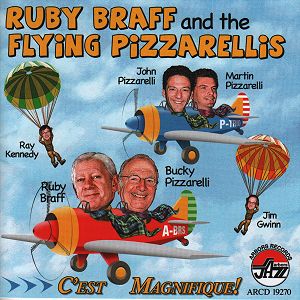1. Lulu's Back in Town
2. Was I to Blame for Falling in Love with
You?
3. You're a Lucky Guy
4. When a Woman Loves a Man
5. C'est Magnifique
6. My Honey's Lovin' Arms
7. I Didn't Know What Time It Was
8. They Can't Take That Away From Me
9. As Time Goes By
10. Sometimes I'm Happy
11. Dancing on the Ceiling
Ruby
Braff -
Cornet
Bucky
Pizzarelli -
Guitar
John Pizzarelli - Guitar, vocals
Ray Kennedy - Piano
Martin Pizzarelli - Bass
Jim Gwinn - Drums
Rachel Domber, Daryl Sherman, Adam Morgenstern,
Dan Morgenstern, Al Lipsky, Gail Firestone,
Ross Firestone ("The Oo-la-la Singers") - Vocals
(track 5)
I
have never understood why more trumpeters
don't take up the cornet. It has a sweeter,
more mellow tone than the trumpet and its
potential has been demonstrated by a number
of great musicians, including Bix Beiderbecke,
Red Nichols, Muggsy Spanier, Rex Stewart and
Wild Bill Davison. Nobody has played the cornet
more mellifluously than Ruby Braff - starting
with those ground-breaking 1950s recordings
with Vic Dickenson (which established the
term "mainstream" in people's consciousness),
followed by a wide range of discs with such
jazzmen as Ellis Larkins, Mel Powell, George
Barnes and Dick Hyman.
This
CD contains the last studio recordings that
Ruby made for the Arbors Jazz label in 2002
- the year before he died. His playing shows
no signs of diminishing powers - indeed, his
work retains the improvisational invention
and beauty of sound that characterised all
his music. The album has added appeal with
the presence of Ruby's old friends, guitarist
Bucky Pizzarelli and drummer Jim Gwinn, and
particularly with the addition of the John
Pizzarelli Trio, a group (including John's
brother Martin) that has produced many exciting
recordings. In fact John (son of Bucky) seems
rather restrained on these sessions, perhaps
wishing Ruby Braff to have the spotlight,
so there are few of the amazing guitar fireworks
that John has given us elsewhere. The session
may be fairly low-key but it is nonetheless
full of joyful music.
The
opening Lulu's Back in Town brings
fine examples of Braff's ability to reach
the highest and lowest reaches of his instrument,
with some remarkably gruff low notes. Ray
Kennedy's piano solo is as well-shaped and
tasteful as you would expect from having heard
him on recordings by John Pizzarelli's trio.
Two choruses from Ruby accompanied only by
the double bass are pure delight.
Several
tunes on the album are familiar jazz standards
but Ruby excelled at choosing lesser-known
numbers to play with - like Was I to Blame
for Falling in Love with You?, a ballad
on which Ruby, Bucky and John solo tenderly.
I was also pleased to find When a Woman
Loves a Man, a sadly neglected piece (not
to be confused with Percy Sledge's When
a Man Loves a Woman), which I had previously
only heard played by an Eddie Condon group
featuring Wild Bill Davison. Ruby starts it
eloquently, with simple backing from Bucky
Pizzarelli. John's solo sticks close to the
melody but Ray's piano solo is more allusive.
Why don't more bands play gorgeous tunes like
this?
You're
a Lucky Guy is the sort of jaunty song
that was meat and drink to Ruby, The rhythm
section swings as strongly as one of Count
Basie's memorable sections, and Perdido
is introduced as a sparky counter-melody.
You can sample here the difference between
the styles of the two guitar-playing Pizzarellis:
John concentrating on single notes while Bucky
is more chordal. Drummer Jim Gwinn swaps effective
eights with Ruby and John. The title-track
has interjections from an unpaid vocal chorus
and some beautifully flowing playing from
Ruby Braff. Again (as throughout the album),
Ray Kennedy's piano is a highlight whether
soloing or accompanying. The next two tracks
continue the near-perfection of this session,
with Braff unselfishly sharing out the honours
with the other members of the group but remaining
the paramount soloist among a group of virtuosi.
Thomas Hustad's perceptive sleeve-note points
out how Ruby varies the music by using different
permutations of the six instruments.
John
Pizzarelli is not only a very talented guitarist
but also a pleasing vocalist, as he exhibits
in They Can't Take That Away From Me,
where he sings the seldom-heard verse and
is then supported in the chorus by Ruby's
inventive obbligato. John also sings As
Time Goes By, including its even less
familiar verse. Ruby's solo is a duet with
Ray Kennedy, reminding us of those outstanding
duets that Ruby recorded with Ellis Larkins
and Dick Hyman. When this track ends, one
is tempted to say "Play it again, Ruby". Sometimes
I'm Happy is taken at an easy loping tempo,
with thrusting drums from Jim Gwinn, and the
CD ends with Dancing on the Ceiling
in which every musician dances lightly and
gracefully.
A
magical album.
Tony
Augarde
